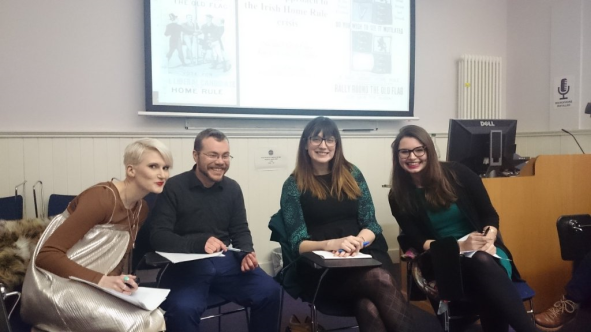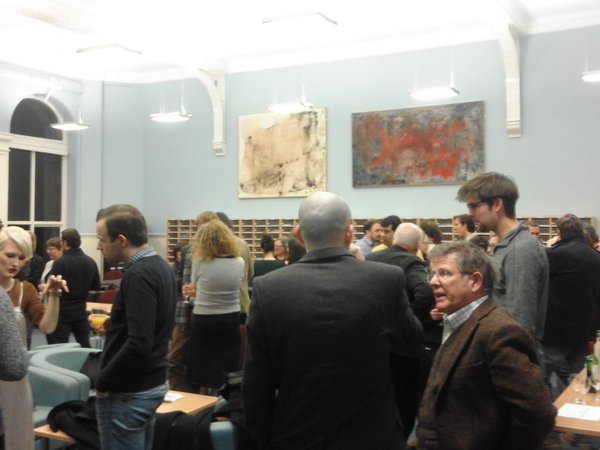Roundtable write up: Four Nations History: A Panel Discussion
Maggie and Naomi (with contributions from colleagues at the University of Edinburgh) reflect on the roundtable discussion of four nations methodologies organised by the University of Edinburgh.
On 10 February, the Modern Irish History and the Scottish History seminar series at the University of Edinburgh co-hosted a Four Nations History panel. Four Nations History Network co-founders Naomi Lloyd-Jones and Maggie Scull spoke with Joe Curran and Laura Harrison on how their PhD research incorporates such approaches. Each speaker had 10 minutes to present their work, and there followed a lively debate on the utility (or lack thereof) of methodologies that can be broadly understood as ‘Four Nations’. It was apparent throughout that there was no agreement – among panellists or audience members – as to what a four nations methodology looks like. However, this ought not to be seen as a negative thing. One of our major aims at the Network has been to provide a non-prescriptive platform for the exploration of alternative ways of understanding the history of these islands. We firmly believe that placing arbitrary restrictions on the definition of ‘Four Nations history’ does not aid the analytical process and will not foster its discussion among historians of the modern period. As Keith Robbins has written, ‘The history of the whole of Britain is so difficult to write precisely because there is no ideal vantage point from which to survey it.’[1] Yet as this roundtable demonstrated, your ‘vantage point’ – be it cities, commemorations, churches, or constituencies – is crucial in determining the manner in which you interpret ‘Four Nations history’.
Here we’ve asked the organisers and our fellow participants for their thoughts on the event and where the debate can go from here.
Roseanna Doughty (University of Edinburgh) explains why the roundtable was arranged
When we planned the panel we were hoping to encourage a lively debate about the advantages and disadvantages of four nation approaches to history. We were also curious to see how the Scottish setting might impact the way in which we engage with four nations history. Well we certainly achieved that! From the organisers’ point of view the panel could not have gone better. We had four amazing and thought-provoking papers, attracted a huge audience which included members of the public and academics from different fields and working at various universities. The debate that followed was one of the most interesting I have attended. Everyone left the room with their heads buzzing with questions and new ideas, ranging from the practical implication, to four nations and euro-scepticism and most importantly ‘When was Wales?’.
One of the things I personally admire about four nations history has been its ability to bring together historians, cynics and believers, from a wide variety of subject areas, institutes and time periods. This is an ethos that both seminar series wish to encourage and while we have worked closely before, the panel gave us the opportunity to get to know academics both inside and outside the department and see how four nations could impact on a wide variety of fascinating topics. On behalf of myself and my fellow convenors, I would like to thank the panel, our chair, Dr Wendy Ugolini, and all that attended.
The panelists on their experience of the event
Naomi Lloyd-Jones
My PhD is a Four Nations history of reactions to the Irish Home Rule crisis, but it is rare that I get the opportunity to talk about the research in the holistic sense, as my conference papers are typically an exploration of grassroots politics in a given part of the United Kingdom. To paraphrase Tim Harris, it is by adopting a Four Nations approach that ‘those who are interested in opinion and out-of-doors’ can ‘understand the whole picture.’[2] The literature on the Home Rule crisis is overwhelmingly Anglo-centric and focused on the machinations of Westminster politicians. The crisis also features (to varying degrees) in the separate histories of Scotland, Wales and Ireland, and in certain local and regional studies of English politics. The overwhelming impression is that Home Rule was not a policy that generated low political excitement; my thesis aims to challenge this notion by comparing responses in England, Scotland and Wales, and determining whether there was a ‘British’ response.
In many respects, I see a study of the Home Rule crisis as a potential counterfoil to the shortcomings of the ‘New British History’. The edited collections that emerged from a series of conferences held in the early 1990s were concerned principally with the history of state construction, and were criticised for perpetuating a more sophisticated Anglocentrism by searching for the origins of something that would anyway come to be comprehended as ‘English’. Home Rule involved the perceived deconstruction of the state, and it is vital to understand how the crisis operated on the British polity, and not just part of it.
Joe Curran (University of Edinburgh)
I have to admit that when I was asked to speak at the Four Nations Panel discussion, I was nervous. I knew that I would be sharing a panel with experts on Four Nations History. My own PhD compares charities and civil society in Dublin and Edinburgh between 1815 and 1845 and I tend to see it primarily as an urban history project. Yet as Dublin and Edinburgh were capital cities, I have to find ways of taking into account their national role in Ireland or Scotland. The Four Nations History Network had already given me the opportunity to write a blogpost on the advantages of combining urban history approaches with Four Nations perspectives and I used my panel paper to further explore some of the issues raised by this topic. Thinking about Four Nations History has made me increasingly interested in the relationship between urbanisation and national identity formation. Did different levels of urbanisation between the Four Nations mean that national identity differed in each? Might there have been differences in the ways in which national identity was understood and displayed in rural and urban parts of the same nation? A Four Nations approach can greatly aid the study of towns and cities in the nineteenth-century United Kingdom but it needs to be able to deal with complexity within as well as between the nations.
Laura Harrison (University of Edinburgh)
Personally, it was a nice break to explore how the Scottish diaspora has dealt with my topic, as it is something I don’t normally get to do. It reinforced some thoughts I was having in terms of my current chapter, and also revealed areas for future research. I’ve received some useful advice and research ideas since the event, which is a plus I was certainly not expecting. Overall, it was a really valuable experience to approach my topic from a slightly different direction.
Since Four Nations History is not something I have thought a great deal about in the past, I enjoyed considering where and how it could be useful as a framework. The discussion also reiterated how we should be frequently questioning and challenging whatever approaches we are using. It was very well-attended and generated a lot of discussion not just that evening but in the days following – always an impressive feat! It was great to get researchers together from different universities, and I hope to see more of these collaborative sort of seminars in the future.
Maggie Scull
I discussed how I use a Four Nations methodology when evaluating the role of the Catholic Church during the Northern Irish Troubles. While a key challenge to Four Nations history is the changed nature of Ireland after the Anglo-Irish Treaty in 1921, the Irish Catholic Church proves an exception as it remained undivided. Historically, the Primate of All Ireland, the head of the Catholic Church in Ireland, resided in Armagh in Northern Ireland. However, a unified English and Welsh Catholic Church hindered the full development of a Four Nations thesis. Due to the IRA’s concentrated bombing campaign in England, the hierarchies in Wales and Scotland responded less frequently to the conflict. One example I discussed with the issue of Catholic funerals for IRA members. After James McDade died when a bomb he planted near a Coventry post office exploded prematurely, the Archbishop of Birmingham denied him a requiem mass. Family members brought McDade’s coffin back to his native Belfast where he received a full Catholic funeral. Instances such as this demonstrated the divided viewpoint of the Catholic Church towards the conflict. While a Four Nations methodology for this topic has its pitfalls, it also provides greater access to archives as well as focuses a transnational approach.
Our views on the discussion
Keith Brown has suggested that ‘most attempts at British History fail because it is conceived as English History with Scottish or Irish add-ons’.[3] However, this event showcased not only a strong desire to avoid such a pitfall, but also a range of scholarship which practices the precise opposite. Questions were raised as to the uniqueness and exceptionality of the individual nations’ experiences and the extent to which Four Nations history risks the blurring or erasing such distinctiveness. This is a valid concern, but it was also argued that a comprehensive Four Nations methodology can allow for the simultaneous investigation of national histories and the creation of a ‘supranarrative’ that explores interrelationships and reveals commonalities. On the other hand, it was posited that an approach that privileges national interactions can ignore tensions within the nations. This is perhaps where a comparative approach, which examines, for example, cities, monuments, dioceses, or elections, could serve as a counterbalance.
In a similar vein, it was asked whether ‘Four Nations’ is in itself a valid term, and whether it has potentially outlived its usefulness. Indeed, in 2014, Toby Barnard posited that the ‘New British history’ of state construction in the early modern period had run out of steam. ‘Four Nations’ is arguably a more inclusive term than the ‘British history’ deployed by the ‘New British historians’, but it undoubtedly has its problems, especially when it comes to defining the nations to be studied. Yet it is not common parlance – Hugh Kearney’s ‘British Isles: A History of Four Nations’ garnered far less attention than Pocock’s ‘plea for a new subject’. It has nonetheless began to permeate political discourses, with David Cameron and Nicola Sturgeon both employing it to justify their positions on the relations between the component parts of the United Kingdom. And, as this event illustrated, it is very much a jumping off point for debate. ‘Four Nations history’, arguably unlike the ‘New British history’, can be interpreted in a plethora of ways. And that is how it should be.
[1] K. Robbins, Nineteenth-Century Britain. England, Scotland, and Wales: The Making of a Nation (1989), p.12.
[2] T. Harris,‘Critical Perspectives: The Autonomy of English History?,’ in G. Burgess (ed.), The New British History: Founding a Modern State, 1603-1715 (London, 1999), p.293.
[3] K.M. Brown, ‘Seducing the Scottish Clio: Has Scottish History Anything to Fear From The New British History?’, in G. Burgess (ed.) The New British History: Founding a Modern State, 1603-1715 (1999), p.241.

